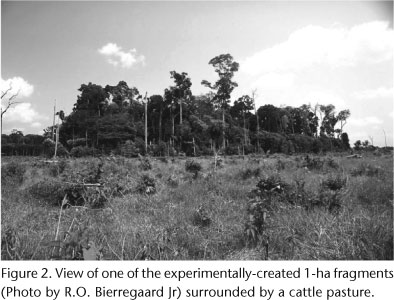Arthropods are the most diverse and abundant group of animals found in tropical lowland forests, and in light of ongoing global change phenomena, it is essential to better understand their responses to anthropogenic disturbances. Here we present a review of arthropod responses to forest deforestation and fragmentation based on studies conducted at the Biological Dynamics of Forest Fragments Project (BDFFP), located in central Amazonia. These studies involved a wide range of arthropod groups. All but one of the studies evaluated changes in total species number or species density in relation to fragment size, (i.e. area effects), and one-third also evaluated edge effects. Our review indicates that almost every arthropod group studied showed some kind of response to reduction in forest area, including altered abundances, species richness or composition in comparisons of different-sized fragments, fragmented and non-fragmented areas, or comparisons of forest edges and forest interiors. These responses tended to be idiosyncratic, with some groups showing predicted declines in abundance or diversity in the fragments while others show no response or even increases. However, some of the observed effects on arthropods, or on the ecological processes in which they are involved, were transient. The most likely explanation for this was the rapid development of secondary growth around fragments, which greatly increased the connectivity between fragments and the remaining forest. Although the BDFFP has provided many insights regarding the effects of forest fragmentation on arthropod assemblages, many diverse groups, such as canopy arthropods, have received scant attention. For those that have been studied, much remains to be learned regarding the long-term dynamics of these assemblages and how landscape context influences local biodiversity. The BDFFP remains an exceptional site in which to investigate how the ecological interactions in which arthropods are engaged are altered in fragmented landscapes.
Area effects; edge effects; insects; secondary succession; tropical forest conservation











